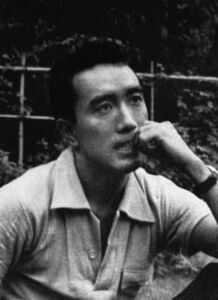Remembering Yukio Mishima:
January 14, 1925–November 25, 1970
Greg Johnson
Spanish translation here
Yukio Mishima was one of the giants of 20th-century Japanese literature. He has exercised an enduring influence on the post-World War II European and North American New Right. In commemoration of his birth, I wish to draw your attention to the following works on this website:
By Mishima:
About Mishima:
- Kerry Bolton, “Yukio Mishima” (Portuguese translation here)
- Jonathan Bowden, “Yukio Mishima“
- Mark Dyal and Nick Fiorello, “Overcoming the Bourgeois Mind and Body” (Portuguese translation here)
- A. Graham, “Beauty and Destruction in Yukio Mishima’s The Temple of the Golden Pavilion“
- A. Graham, “Yukio Mishima’s The Sailor Who Fell from Grace with the Sea“
- Greg Johnson, Mishima’s English-Language Videos on YouTube
- Emi Mann Kawaguchi, “Yukio Mishima and Richard Wagner: Art and Politics, or Love and Death“
- Trevor Lynch, Review of Mishima: A Life in Four Chapters (Spanish translation here)
- Christopher Pankhurst, “The Immortal Death of Yukio Mishima“
- Riki Rei, “Naoki Inose’s Persona: A Biography of Yukio Mishima“
- Romano Vulpitta, “Yukio Mishima, Yojuro Yasuda, and Fascism,” Part 1, Part 2 (Czech translation: Part 1, Part 2; Greek translation here)
I also recommend watching Paul Schrader’s beautiful and moving dramatic portrait Mishima: A Life in Four Chapters, now available in a stunning new edition from the Criterion Collection.
Many English translations of Mishima’s writings are available, but not all of his books are worth reading. I recommend beginning with The Sound of Waves
, his most naive, charming, and popular novel. Those drawn to his studies of nihilism should read The Sailor Who Fell From Grace with the Sea
and The Temple of the Golden Pavilion
(the latter is partly dramatized in Schrader’s Mishima). The best collection of Mishima’s stage works is My Friend Hitler and Other Plays
. (My Friend Hitler is about the Röhm purge.) Mishima’s most important autobiographical work is Confessions of a Mask
. (Sun and Steel
also falls in this category, but should be read after Confessions.) Mishima’s philosophy of life and death is found in his Way of the Samurai
, a commentary on the Hagakure
.
Starting in the late 1950s, Mishima also dabbled in acting and directing. In 1966, he directed and starred in a 30 minute film adaptation of his short story “Patriotism,” about the ritual suicide of a military officer after a failed coup. (Also a theme of Mishima’s 1969 novel Runaway Horses.) After Mishima’s death, the film of Patriotism was withdrawn by his widow, but after she died, it was released on DVD by the Criterion Collection.
Mishima’s charismatic performance as a swaggering tough guy in Masumura Yasuzo’s entertaining 1960 gangster movie Afraid to Die is available on DVD. He also appears as a human statue in Black Lizard
, a movie so weird and wonderful that it is worth seeking out on VHS. (It highly deserves a DVD release.) Black Lizard is based on a play by Mishima, but I was unable to determine how faithfully it follows the original.
There is very little good secondary literature on Mishima. I can recommend Henry Scott Stokes’ biography The Life and Death of Yukio Mishima, Marguerite Yourcenar’s Mishima: A Vision of the Void
, and Roy Starrs’ Deadly Dialectics: Sex, Violence, and Nihilism in the World of Yukio Mishima
. Yourcenar and Starrs deal with Mishima in relation to philosophy and religion, and although the theses and arguments of both authors strike me as confused, they still manage to ferret out a lot of interesting information.
In 2013, Naoki Inose’s massive Persona: A Biography of Yukio Mishima appeared in English. This exhaustively researched volume will probably stand for a long time as the definitive work on Mishima. It contains too much information for the casual reader, but for Mishima fans like me, it is essential reading, filled with detailed and tantalizing accounts of Mishima’s many untranslated writings, fiction and non-fiction, inlcuding his many political statements. For the first time, it is possible for people who do not speak Japanese to gain a clear and detailed picture of Mishima’s politics.
Finally, I want to recommend a little-known website by an important Counter-Currents writer: Jack Donovan’s Headless God: A Tribute to Yukio Mishima.
Remembering%20Yukio%20Mishima%3A%20January%2014%2C%201925%E2%80%93November%2025%2C%201970
Enjoyed this article?
Be the first to leave a tip in the jar!
Related
-
Remembering Bill Hopkins
-
Nowej Prawicy przeciw Starej Prawicy, Rozdział 4: Teoria i praktyka
-
Nowej Prawicy przeciw Starej Prawicy, Rozdział 3: Metapolityka i wojna tajemna
-
Counter-Currents Radio Podcast No. 583: Judd Blevins on His Recall and Pro-White Politics
-
Remembering Sam Francis (April 29, 1947–February 15, 2005)
-
Nowej Prawicy przeciw Starej Prawicy, Rozdział 2: Hegemonia
-
Nowej Prawicy przeciw Starej Prawicy, Rozdział 1: Nowa Prawica przeciw Starej Prawicy
-
Nowej Prawicy przeciw Starej Prawicy: Wprowadzenie

2 comments
Greg,
OT here, but it seems hatreon is frozen. My donations to you & others didn’t happen in December, and not yet this month either.
Suggest you set up an account on makersupport or similar soon. Rumor is that paypal & 1 or more credit card processors have stop allowing hatreon to continue.
Let people know how you want to proceed. Am going to start moving to makersupport for those of my hatreon pledges who are set up there. Press on.
I joined makersupport: https://www.makersupport.com/gregjohnson
Comments are closed.
If you have Paywall access,
simply login first to see your comment auto-approved.
Note on comments privacy & moderation
Your email is never published nor shared.
Comments are moderated. If you don't see your comment, please be patient. If approved, it will appear here soon. Do not post your comment a second time.